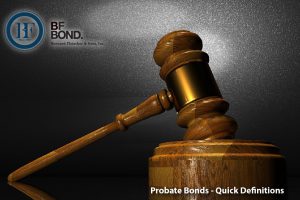Definition.
Executors and Administrators require a bond, because they representatives of decedents’ estates and have the responsibility of administering and settling those estates. An executor is nominated by the testator for the purpose of executing the will. Responsibilities include gathering up and protecting the assets of the estate, obtaining information in regard to all beneficiaries named in the will and any other potential heirs, collecting and arranging for payment of debts of the estate, approving or disapproving creditor’s claims, making sure estate taxes are calculated, forms filed and tax payments made, and in all ways assisting the attorney for the estate.
State laws, which vary by state, may require an executor to post a bond in a certain amount to ensure that they carry out all the duties required of them in good faith. A bond may be an insurance policy required by a court for the benefit of a trust or an estate. The bond provides protection against the possibility of fraud or embezzlement by an executor. The will maker may request in the will that no bond be required.
The following is an example of a state statute dealing with executors’ bonds:
” Section 1. An executor, temporary executor or temporary administrator with the will annexed, administrator, administrator with the will annexed, special administrator, receiver of an absentee, conservator, temporary guardian and, unless otherwise expressly provided, a guardian or trustee under a will or appointed by the probate court, including a trustee under a will holding property for public charitable purposes, before entering upon the duties of his trust, shall give bond with sufficient sureties, in such sum as the probate court may order, payable to the judge of said court and his successors, and with condition substantially as follows:
- In the case of an executor or administrator with the will annexed:
First, To make and return to the probate court within three months a true inventory of all the testator’s real and personal property which at the time of making such inventory shall have come to his possession or knowledge;
Second, To administer according to law and to the will of the testator all personal property of the testator which may come into his possession or into the possession of any person for him, and also the proceeds of any of the real estate of the testator which may be sold or mortgaged by him;
Third, To render upon oath a true account of his administration at least once a year until his trust is fulfilled, unless he is excused therefrom in any year by the court, and also to render such account at such other times as the court may order.
- In the case of an administrator:
First, To make and return to the probate court within three months a true inventory of all the intestate’s real and personal property which at the time of making such inventory shall have come to his possession or knowledge;
Second, To administer according to law all the personal property of the deceased which may come into his possession or into the possession of any person for him, and also the proceeds of any of the real property of the deceased which may be sold or mortgaged by him;
Third, To render upon oath a true account of his administration at least once a year until his trust is fulfilled, unless he is excused therefrom in any year by the court, and also to render such account at such other times as the court orders;
Fourth, To pay to such persons as the court orders any balance remaining in his hands upon the settlement of his accounts;
Fifth, To deliver his letters of administration into the court if a will of the deceased is thereafter duly proved and allowed.
- In the case of a special administrator:
That he will make and return to the probate court within such time as it orders a true inventory of all the personal property of the deceased which at the time of making such inventory shall have come to his possession or knowledge, and that he will, whenever required by the probate court, truly account on oath for all the property of the deceased which may be received by him as such special administrator, and will deliver the same to any person who may be appointed executor or administrator of the deceased, or may be otherwise lawfully authorized to receive the same.
- In the case of a receiver of an absentee under chapter two hundred:
With condition substantially as provided for the bond of an executor or administrator, and with the further condition to obey all orders and decrees made by the probate court.
- In the case of a temporary guardian or conservator appointed under section fourteen or twenty-one of chapter two hundred and one:
That he will make and return to the probate court within such time as it shall order a true inventory of all the personal property of the ward which at the time of making such inventory shall have come to his possession or knowledge, and that he will, whenever required by the probate court, truly account on oath for all the property of the ward which may be received by him as such temporary guardian or conservator, and will deliver it to any person who may be appointed guardian or conservator or may be otherwise lawfully authorized to receive it.
- In the case of a guardian or conservator:
First, To make and return to the probate court at such time as it orders a true inventory of all the real and personal property of the ward which at the time of making such inventory shall have come to his possession or knowledge;
Second, To manage and dispose of all such property according to law and for the best interests of the ward, and faithfully to perform his trust in relation to such property and to the custody, education and maintenance of the ward;
Third, To render upon oath at least once a year until his trust is fulfilled, unless he is excused therefrom in any year by the court, a true account of the property in his hands, including the proceeds of all real property sold or mortgaged by him and of the management and disposition thereof, and also to render such account at such other times as said court may order;
Fourth, At the expiration of his trust to settle his account in the probate court or with the ward or his legal representatives, and to pay over and deliver all the property remaining in his hands, or due from him on such settlement, to the person or persons lawfully entitled thereto.
- In the case of a trustee under a will or appointed by the probate court:
First, To make and return to the probate court at such time as it orders a true inventory of all the real and personal property belonging to him as trustee which at the time of the making of such inventory shall have come to his possession or knowledge;
Second, To manage and dispose of all such property, and faithfully to perform his trust relative thereto according to law and to the will of the testator or the terms of the trust as the case may be;
Third, To render upon oath at least once a year until his trust is fulfilled, unless he is excused therefrom in any year by the court, a true account of the property in his hands and of the management and disposition thereof, and also to render such account at such other times as said court orders;
Fourth, At the expiration of his trust to settle his account in the probate court, and to pay over and deliver all the property remaining in his hands, or due from him on such settlement, to the person or persons entitled thereto.
- In the case of a temporary executor appointed under section thirteen of chapter one hundred and ninety-two or a temporary administrator with the will annexed appointed under section seven A of chapter one hundred and ninety-three:
First, when required by the provisions of chapter one hundred and ninety-two and whenever required by the probate court, to make and return to the probate court a true inventory of all the deceased’s real and personal property which at the time of making such inventory shall have come to his possession or knowledge, and to render upon oath a true account of his administration;
Second, to deliver all the property of the deceased which may be received by him as such temporary executor or temporary administrator with the will annexed to any person who may be appointed executor, administrator or administrator with the will annexed of the deceased, or may be otherwise lawfully authorized to receive the same.”
Executor Bond, Conservator Bond, Probate Bond, Administrator Bonds, Trustee Bond


